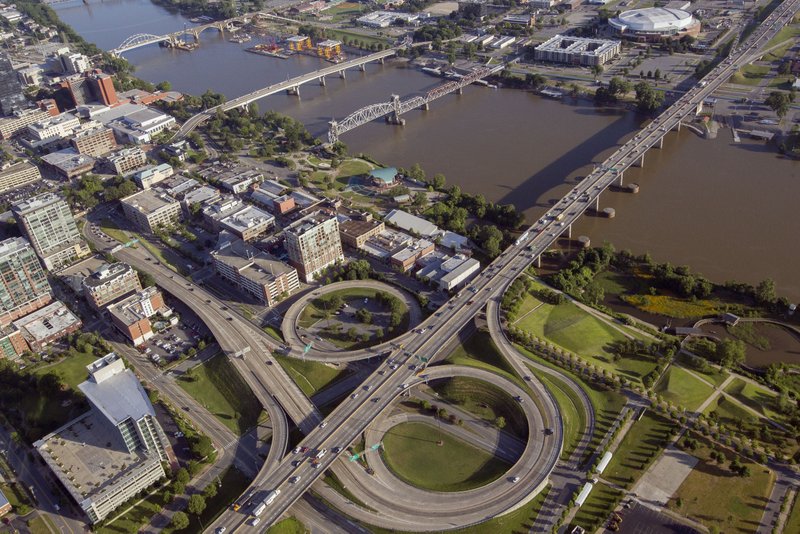LITTLE ROCK -- Work on the first phase of the 30 Crossing project will markedly change how drivers can negotiate downtown Little Rock and North Little Rock, in some cases permanently, starting next week.
The on-ramp to eastbound Interstate 30 via the ramp at East Third and Ferry streets in Little Rock will be closed for good, as will a one-block section of East Fourth Street between Rector and Collins streets, according to the Arkansas Department of Transportation.
The East Ninth Street overpass, including its intersections with the I-30 frontage roads, will be closed through March.
The department also announced other city street closings on both sides of the Arkansas River that will last through the summer or through project completion, which is 2025, according to the financial plan the agency developed for the project.
The ramp and street closings mark the beginning of construction for the project's first phase, which has a price tag of $638.2 million.
When planning began six years ago on remaking the 6.7-mile corridor through downtown Little Rock and North Little Rock, the department identified $631.7 million it could spend on the project, knowing all the improvements might not be doable with that budget.
Most of the money came from a statewide 0.5% sales tax voters approved in 2012 as part of the agency's $1.8 billion Connecting Arkansas Program, which targets regionally significant projects for improvements, including I-30.
The team that the agency selected to do the final design and build the project -- Kiewit-Massman Constructors, a joint venture -- put the price for all the work at nearly $1 billion, at which point the department decided to phase the construction.
The first phase is centered on a new Arkansas River bridge. It will feature three through lanes, two-collector-distributor lanes and an auxiliary lane in both directions.
In Little Rock, the phase will include a new I-30/Cantrell Road interchange. Removal of the cloverleaf ramps of the existing interchange will leave 18 acres available for a park or other public space.
In North Little Rock, the phase will include a new interchange at Broadway and improvements to I-30 from there to Interstate 40.
Work that is starting this month includes construction on Mahlon Martin Street, the east frontage road between East Sixth Street and the Cantrell Road interchange and the west frontage road entrance ramp at the University of Arkansas at Little Rock William H. Bowen School of Law.
On I-30 itself, work will begin to remove the center median on the North Little Rock side.
The ramp and road closings that will take place beginning in early December will require some detours.
Drivers who use the on-ramp to I-30 from East Third and Ferry streets are being asked to use the on-ramps at East Sixth, Cumberland or East Second streets.
Drivers who used the East Ninth Street overpass will be asked to detour north to East Sixth Street. Separate detour routes for trucks and other maps are available at https://bit.ly/2IMvCtC.
Meanwhile, other changes next month include shifting traffic lanes to the north between frontage roads on Bishop Lindsey Avenue in North Little Rock through completion of the project.
Starting Dec. 3, a section of Capitol Avenue between Rector and Collins Street and Rector Street will be reduced to one lane between East Fourth and East Sixth streets. Both will open next summer.
Traffic will be controlled by signs, construction barrels and barriers, the department said.
The work ramps up at the same time litigation seeking to halt the project also ramps up.
A hearing on the latest injunction against the project is set to begin at 9 a.m. Dec. 2 before Pulaski County Circuit Judge Mackie Pierce. The hearing will be held virtually because of social-distancing protocols associated with the coronavirus pandemic.
The Arkansas Supreme Court ruled Oct. 29 that Amendment 91 to the Arkansas Constitution limited proceeds from the 0.5% statewide sales tax collected under the amendment to roads no wider than four lanes. I-30 is a six-lane thoroughfare at the site of 30 Crossing work, which will widen it to as much as 10 lanes.
Earlier this month, a coalition of downtown neighborhood groups and residents filed a lawsuit in Pulaski County Circuit Court seeking to require the department to document it no longer was using Amendment 91 money on the project before work can continue.
Lori Tudor, the department director, said in a response issued Nov. 16 that no Amendment 91 funds have been used since the Arkansas Supreme Court ruling. Instead, work is being paid with $180 million in regular federal transportation money as well as the state money that is required to match it.
